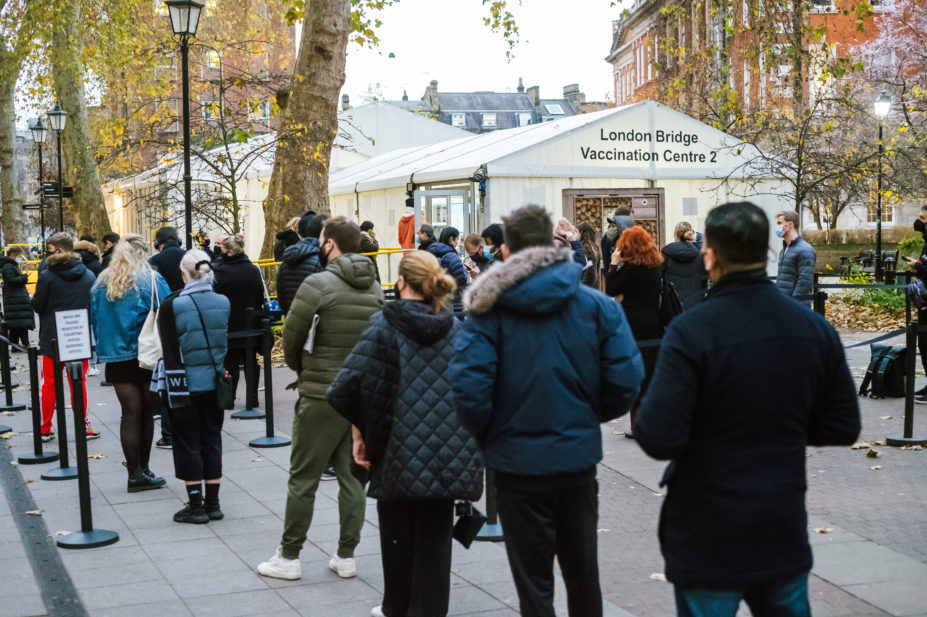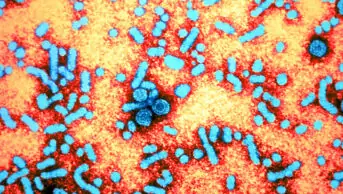
Tom Leighton / Alamy Stock Photo
On 12 December 2021, prime minister Boris Johnson announced that booster jabs would be offered to all eligible adults aged 18 years and over in England by the end of December 2021.
Johnson’s announcement was made in response to the growing threat of the Omicron variant of the SARS CoV-2 virus, which was classified as a “variant of concern” by the World Health Organization on 26 November 2021, and which experts have warned could more easily evade antibodies generated in people with just two vaccine doses.
As a result, on 29 November 2021, the Joint Committee on Vaccination and Immunisation (JCVI) issued advice to deliver booster doses to “broaden protection” against the new variant.
Now, nearly two weeks since Johnson announced the booster drive, over 30 million people have received a booster vaccine, with community pharmacy playing a key role.
Why do we need a booster campaign?
The latest wave of COVID-19 infections, which for the first time topped 100,000 daily cases on 22 December 2021, has ramped up the COVID-19 booster campaign that was first floated in government documents in February 2021 as part of wider intentions to “live with the virus”.
The JCVI initially advised in June 2021 that protection against severe COVID-19 offered by the Pfizer/BioNTech, Oxford/Astrazeneca and Moderna vaccines would last “at least six months for the majority” after the second, after which time patients will require a booster vaccine to provide continued protection.
However, in updated advice published in November 2021 following the emergence of the Omicron variant that month, the JCVI said the interval between second and booster dose should be halved to three months in an effort to speed up delivery of the vaccine.
The booster jab is also expected to add resilience against emerging variants of the virus, particularly the Omicron variant, which is now considered to be the dominant strain in London, with 10,092 cases as of 18 December 2021, over the previous Delta variant which, at its peak on 29 December 2020, reached nearly 20,000 cases in the capital.
Who is eligible for a booster?
From 20 September 2021, the UK government began inviting people aged over 50 years as well as those at risk of serious illness to receive a booster jab.
However, as the number of Omicron cases began rising sharply in early December 2021, the booster programme was extended on 15 December 2021 to all eligible adults aged 18 years and over who had had their second dose more than three months earlier.
COVID-19 vaccinations for children have also been rolling out, with those aged 12 to 15 years able to receive one dose, while those aged 16 and 17 years can now also get two doses of the vaccine.
People with severely weakened immune systems, such as those with a blood cancer or those who have undergone an organ transplant, are being offered a third vaccine dose at least eight weeks after their second dose. This is administered in addition to a later booster jab, which will be administered three months after the third dose.
This advice follows the publication of preliminary data from the OCTAVE trial, which showed that 89% of participants — all of whom were immunosuppressed — mounted an immune response to COVID-19 after two doses of either the Pfizer-BioNTech or Oxford-AstraZeneca vaccine.
However, in around 40% of immunosuppressed participants, the levels of COVID-19 antibodies were found to be lower than those found in people without immunosuppression. The authors said “the functional significance of these findings in providing protection from subsequent SARS-CoV-2 exposure is not currently known”.
What vaccines are being used?
Shortly before the start of the UK booster campaign, JCVI advised on 14 September 2021 that the Pfizer/BioNTech vaccine should be administered as a booster, “irrespective of which product was used in the primary schedule”.
JCVI added that people could also receive a half-dose of the Moderna vaccine, explaining that a half dose is advised over a full dose owing to the levels of reactogenicity seen in the COV-BOOST trial, in which some participants were boosted with a full Moderna dose.
However, the JCVI advised that if either the Moderna or Pfizer/BioNTech vaccine “cannot be offered (e.g. due to contraindication)”, patients can be administered the Oxford/AstraZeneca vaccine.
University Hospital Southampton NHS Foundation Trust’s COV-BOOST trial, which started in May 2021, enrolled nearly 3,500 participants to determine which vaccines are most effective as a COVID-19 booster. In results published on the 3 December 2021, it found that all types of booster vaccines increased immunity, although there were large differences in spike protein antibody levels after 28 days across the vaccines.
In people who had received two initial doses of the Oxford/AstraZeneca vaccine, these ranged from 1.8 times higher to 32.3 times higher with different booster vaccines. For those who had received the Pfizer/BioNTech vaccine initially, the range was 1.3 times higher to 11.5 times higher. Booster results were similar for those aged 30 to 69 years and those aged 70 years or older.
How effective are the booster doses against the Omicron variant?
Two doses of both the Pfizer/BioNTech and Moderna vaccines are widely thought to be less effective against the Omicron variant than they were against the Delta variant. However, research is still in the early stages.
A pre-print study by researchers in South Africa — where the Omicron variant was first detected — suggests the effectiveness of two doses of Pfizer/BioNTech vaccine dropped from 80% against infection with the Delta variant to around 30% against infection with the Omicron variant. Meanwhile, effectiveness against hospitalisation dropped from 93% to 70% in the new Omicron variant.
The Moderna vaccine is not currently offered in South Africa, but pre-print results from further research conducted in the United States — which was funded by Moderna — suggests a reduced effectiveness of two doses of the Moderna vaccine by up to 84-fold against Omicron compared with the Delta variant. However, the study adds that a third dose was very effective against the new strain of the virus, creating “an approximate 12-fold improvement in Omicron neutralisation”.
Similarly, a statement from Pfizer and BioNTech on 8 December 2021 said preliminary studies showed that three doses of the vaccine were effective at neutralising Omicron as it “increases the antibody titers by 25-fold”.
The statement added that the companies are developing a “variant-specific vaccine for Omicron and expect to have it available by March [2022]”.
How are pharmacies involved in the booster campaign?
The booster jabs are being administered through the same delivery model as the first two doses — through vaccination centres, sites led by primary care networks, and in community pharmacies.
As of 3 December 2021, there were 1,336 community pharmacies running vaccination sites in England. These sites have now been asked to provide vaccination appointments 12 hours per day, seven days a week, to meet the government’s new booster target.
To help achieve this, health secretary Sajid Javid told the House of Commons on 13 December 2021 that the government planned to involve to involve “hundreds more pharmacists” in the booster campaign.
However, a written parliamentary answer published on 13 December 2021 revealed that of the 5,376 expressions of interest that had been received from 4,733 pharmacy contractors to deliver COVID-19 vaccination boosters, just 1,454 (27%) were accepted by NHS England. Nick Kaye, vice chair of the National Pharmacy Association (NPA), said the statistics were “scandalous” and called on NHS England to reconsider existing pharmacy applications “immediately”.
In Wales, COVID-19 vaccinations have similarly been provided through mass vaccination centres, GP practices and community vaccination centres, with 34 community pharmacies in Wales commissioned to provide COVID-19 vaccinations. In a press release issued by Public Heath Wales on 28 September 2021, Christopher Johnson, interim head of Public Health Wales’s Vaccine Preventable Disease Programme, said that most COVID-19 booster vaccinations in Wales “will be offered at the existing mass vaccination centres, with invitations issued by local health boards”.
However, in Scotland, COVID-19 vaccinations have been primarily administered through local GP practices and in community hubs. A spokesperson from Community Pharmacy Scotland said on 8 July 2021 that there are “no solid plans” to engage community pharmacies in the booster campaign, with only a small number of remote and rural pharmacies in Scotland having delivered the first and second COVID-19 vaccinations.
Who will be able to administer the booster shots?
Advice on who can administer COVID-19 vaccines has not changed during the booster campaign.
Throughout the vaccination programme, the NHS has offered additional workforce, “including non-registered trained vaccinators”, using the national protocol and national agreements with volunteering organisations.
The national protocol was published in January 2021 and allows “those who are registered healthcare professionals who cannot operate under a [patient group direction], and those who are not registered healthcare professionals, to safely administer a licensed or temporarily authorised COVID-19 or influenza vaccine”. This includes pharmacy technicians.
NHS England has advised vaccination sites to maximise the use of volunteers wherever possible, with further workforce and training guidance for the booster campaign to be released shortly.
On 13 December 2021, a news story on the government website revealed that that 750 armed forces personnel would be deployed to ramp up the rate of vaccination in England and Scotland, including more than 100 personnel to provide planning and logistics support to the programme.
The rest of the armed forces personnel will be administering vaccinations in small teams across the country.
Are we going to have to give boosters every year?
Whether COVID-19 vaccinations will become an annual occurrence has yet to be determined. However, in August 2021, The Times revealed that the government has already started ordering Pfizer/BioNTech vaccines for a booster campaign in autumn 2022.
Chris Whitty, chief medical officer for England, said in June 2021 that he expects that over the next two or three years “new variants may well lead to us having to revaccinate, or consider at least boosting vaccinations, as they come through”.
However, in five years, Whitty said he would expect polyvalent vaccines to have been developed that “hold the line to a very large degree against even new variants as they come in”.
Can the COVID-19 booster jab be given at the same time as the flu vaccine?
The JCVI’s final guidance on COVID-19 booster jabs published on 14 September 2021 said it would be safe to receive both jabs at the same time, “usually in different arms”.
In September 2021, pre-peer reviewed results from the ‘Combining influenza and COVID-19 vaccination’ (ComFluCOV) study showed that patients receiving the flu and COVID-19 vaccine at the same time had similar immunity levels and side-effect profiles, with 77% (254 participants) of those who received both vaccines at the same time reporting one or more side effects within seven days after vaccination. This compared with 75% (239 participants) of those who received only the COVID-19 vaccine at the first visit.
Useful links
- Joint Committee on Vaccination and Immunisation: ‘JCVI statement regarding a COVID-19 booster vaccine programme for winter 2021 to 2022‘
- NHS England: ‘COVID-19 vaccination autumn/winter (phase 3) planning’ advice to pharmacy-led sites
- NHS England: ‘National call: Next steps for the NHS COVID-19 vaccine deployment‘
- CovBoost trial website
- ComFluCov trial website
Important dates
30 June 2021 — The Joint Committee on Vaccination and Immunisation publishes interim advice on a potential two-stage booster programme
14 September 2021 — Final advice from the Joint Committee on Vaccination and Immunisation outlines who should receive a booster COVID-19 vaccine and when
During September 2021 — Newly approved vaccination sites go live
20 September 2021 — COVID-19 booster campaign begins in England for patients aged over 50 years and those at risk of serious disease
15 November 2021 — Booster programme expands to include people aged over 40 years
26 November 2021 — World Health Organization designates Omicron as a variant of concern
29 November 2021 — UK government agrees to offer booster jab to all eligible adults aged 18 years and over by the end of January 2021
12 December 2021 — The prime minister announces a new target to give all eligible adults aged 18 years and over a booster jab by 31 December 2021


